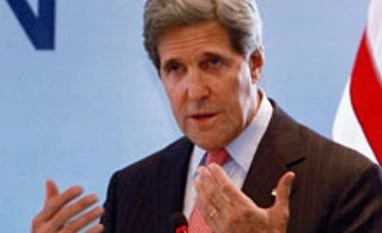Kerry said the prospect of a hotter, drier climate throughout the Middle East and parts of Asia will place more strain on the most precious resource of all -- fresh water.
"We've already seen tensions rise around the basins of the Nile River in Africa, the Indus River in South Asia, and of course, the Mekong River in Southeast Asia," he said.
Covering an area of more than 1 million square kilometres, the Indus basin touches 4 countries: China, India, Pakistan and Afghanistan.
Kerry said the bottom line is that the impacts of climate change can exacerbate resource competition, threaten livelihoods and increase the risk of instability and conflict.
"Because the world is so extraordinarily interconnected today -- economically, technologically, militarily, in every way imaginable. Instability anywhere can be a threat to stability everywhere," he said.
In a major foreign policy speech, Kerry said the US will have to integrate climate considerations into every aspect of its foreign policy -- from development and humanitarian aid to peacebuilding and diplomacy.
"That starts with getting a better understanding of the complex links between climate change and national security."
Kerry's comments come ahead of a major meeting that will bring 195 countries together to seek an agreement at limiting global warming to a maximum of 2C above pre-industrial levels.
The UN Framework Convention on Climate Change, from November 30 to December 11 in Paris, aims to achieve a binding agreement on climate change.
Kerry, who will attend the UN meeting, said: "If we can better identify 'red flags' of risk around the world, we can better target our diplomacy and development assistance in order to enable those nations to become more resilient, more secure, and less likely to fall into a full-fledged war or humanitarian crisis."
The Obama Administration, he said, has made climate change a priority and an effective global agreement is within reach.
"Every single meeting we have we raise this, leading into the Paris talks next month," he said.
"At the heart of that fight, we are seeking to reach an ambitious, durable, and inclusive agreement at the UN climate conference next month in Paris. That's our goal."
He said the kind of agreement "we're working toward is one that will prove that the world's leaders finally understand the scope of the challenge that we are up against.
You’ve reached your limit of 5 free articles this month.
Subscribe now for unlimited access.
Already subscribed? Log in
Subscribe to read the full story →

Smart Quarterly
₹900
3 Months
₹300/Month
Smart Essential
₹2,700
1 Year
₹225/Month
Super Saver
₹3,900
2 Years
₹162/Month
Renews automatically, cancel anytime
Here’s what’s included in our digital subscription plans
Access to Exclusive Premium Stories
Over 30 subscriber-only stories daily, handpicked by our editors


Complimentary Access to The New York Times
News, Games, Cooking, Audio, Wirecutter & The Athletic
Business Standard Epaper
Digital replica of our daily newspaper — with options to read, save, and share


Curated Newsletters
Insights on markets, finance, politics, tech, and more delivered to your inbox
Market Analysis & Investment Insights
In-depth market analysis & insights with access to The Smart Investor


Archives
Repository of articles and publications dating back to 1997
Ad-free Reading
Uninterrupted reading experience with no advertisements


Seamless Access Across All Devices
Access Business Standard across devices — mobile, tablet, or PC, via web or app



)
